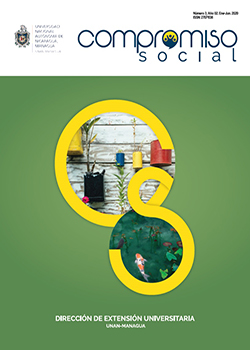La formación integral universitaria aplicada a los nuevos contextos
DOI:
https://doi.org/10.5377/recoso.v2i3.13432Palabras clave:
Formación integral, competencias profesionales, valores y actitudes, gestión del conocimiento, educación inclusivaResumen
Este artículo del proyecto de reingeniería de la conceptualización práctica de la formación integral universitaria aplicada a los nuevos contextos (educativos, políticos, culturales, ideológicos, sociales, tecnológicos y económicos), requiere de aprendizajes vivenciales y significativos que les permita aplicarlos en todos los contextos antes mencionados. La Formación Integral Universitaria debe ser un tema prioritario para la UNAN – Managua; el contexto hoy en día es dinámico; determinado por nuevos desafíos y retos que impone el mundo contemporáneo, señalado por los cambios vertiginosos del conocimiento; la formación no es brindar únicamente conocimientos, sino incluir otras perspectivas. La metodología se sustenta en los pilares de la Educación Popular, se basa en procesos participativos, potenciando el protagonismo de los sujetos de cambios sociales. Se organizó en cuatro fases: diagnóstica, intervención, evaluación y sistematización; generó espacios de debate y análisis que contribuyen a la necesidad institucional de reconceptualizar la formación integral universitaria y operativizarla como eje de discusión e información en procesos académicos y extracurriculares. Los posicionamientos teóricos asumidos fortalecen el quehacer de la universidad en el desarrollo de profesionales con una visión holística y constructiva del país, ratificando la pertinencia en el contexto sociopolítico como elemento estratégico y necesario para la nación.
510
Descargas
Publicado
Cómo citar
Número
Sección
Licencia
Derechos de autor 2020 Universidad Nacional Autónoma de Nicaragua, Managua (UNAN-Managua)

Esta obra está bajo una licencia internacional Creative Commons Atribución-NoComercial-CompartirIgual 4.0.




